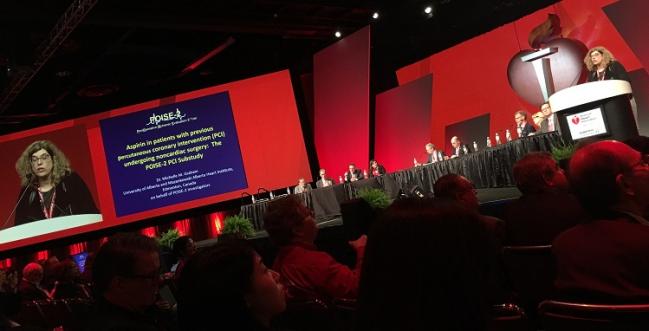Aspirin Protective Against Early Death/MI in Prior PCI Patients Undergoing Noncardiac Surgery
A post hoc analysis shows that post-PCI patients, some 10 years out from their procedure, saw different results from the primary POISE-2 population.

ANAHEIM, CA—Aspirin should not be withheld prior to noncardiac surgery in patients with a history of PCI, even if their coronary procedure occurred years earlier, a new analysis from POISE-2 suggests.
“Among those with prior PCI undergoing noncardiac surgery, perioperative aspirin may be more likely to benefit than harm patients,” Michelle M. Graham, MD (University of Alberta, Edmonton, Canada), told attendees during a late-breaking clinical science session here at the American Heart Association 2017 Scientific Sessions today.
The findings run counter to the primary results of the POISE-2 trial, which concluded there was no sign of a protective effect of aspirin—and indeed, some bleeding risk—among a broader population of patients at risk for vascular complications.
According Graham, more than 200 million patients undergo noncardiac surgeries around the globe every year and 10 million of them suffer major vascular complications associated with increased mortality, hospitalizations, and cost. Patients who have undergone prior PCI face an increased risk of perioperative complications.
Post Hoc Analysis
POISE-2, conducted at 135 centers in 35 countries, randomized 10,010 patients undergoing noncardiac surgery to perioperative aspirin or placebo. The trial ultimately found no difference between groups for death or MI at 30 days, but did see an increased risk of bleeding with aspirin.
The current analysis, which was not prespecified, looked specifically at the 470 patients (from 82 centers in 21 countries) who had previously undergone PCI, equally randomized to aspirin or placebo. Of note, patients who had received a drug-eluting stent within 1 year or a bare-metal stent within 6 weeks prior to their noncardiac surgery were excluded from POISE-2. Median time from PCI to surgery was 64 months, and bare-metal stents were twice as common as DES (54.3% and 25.3%, respectively).
In contrast to what was seen for the overall trial, aspirin in patients with prior PCI significantly reduced the risk of the primary endpoint of death or nonfatal MI at 30 days: 6% in the aspirin arm and 11.4% in the placebo arm (HR 0.50; 95% CI 0.26-0.95; P = 0.33 for the interaction). A significant difference was also seen for MI only (5.1% vs 11.0%; HR 0.55; 95% CI 0.22-0.87). No significant difference was seen for mortality, and importantly bleeds did not differ significantly between groups.
In additional analyses, investigators also looked at the key POISE-2 outcomes among patients with a history of CAD to see if the PCI subgroup effect was merely reflective of preexisting PCI. For the 2,268 CAD patients in the trial, however, no significant differences in the primary outcome or in MI were seen.
“For every 1,000 patients with prior PCI, perioperative aspirin will prevent 59 MIs but cause eight major bleeds,” Graham concluded.
Confirming Practice
Bernard Gersh, MB, ChB, DPhil (Mayo Clinic, Rochester, MN), the scheduled discussant, cautioned that subset, post hoc analyses are “potentially dangerous” but also in this case “interesting,” particularly since the magnitude of benefit seen for the endpoint of MI was double that seen in the placebo-treated group. That said, he noted, the confidence intervals are wide.
The lack of an interaction with the CAD patients was also important, he observed. “This really does emphasize that the differences that we’re seeing were due to prior PCI and stenting as opposed to coronary disease per se.”
Calling the study “hypothesis-generating,” Gersh nevertheless concluded that the findings reinforce what most clinicians are likely doing in clinical practice. “I’m not going to stop aspirin for a noncardiac surgery [in prior PCI patients] unless it is absolutely essential,” such as surgery of the neural axis, he said. Moreover, the findings are “biologically plausible,” Gersh added. “I can perfectly understand why aspirin would be beneficial in the perioperative period, which is a prothombotic state in patients undergoing noncardiac surgery.”
Especially striking for Gersh was the timing of noncardiac surgery relative to the earlier PCI, particularly since more than half of patients got a bare-metal stent. “I think we have very good data that in the first 2 to 3 months after stent placement there is a higher risk of stent thrombosis in patients that are untreated with antiplatelet therapy, but I am surprised that it is so high 3 to 10 years later, particularly with BMS that should be fully endothelialized.”
Graham, for her part, agreed with the biological plausibility of their findings, noting that other studies have shown that previous PCI is associated with prolonged endothelial dysfunction. “Even if these stents are endothelialized, their endothelial function is not normal,” she said. “There are reports of stent thrombosis as late as 10 to 15 years out in noncardiac surgery. So, do we need a clinical trial, based on all the evidence that’s out there? I’m wondering whether people would be willing to withdraw aspirin in this population.”
Gersh agreed, saying: “I would not do a clinical trial.
Shelley Wood was the Editor-in-Chief of TCTMD and the Editorial Director at the Cardiovascular Research Foundation (CRF) from October 2015…
Read Full BioSources
Graham MM. Aspirin in patients with previous percutaneous coronary intervention (PCI) undergoing noncardiac surgery: the POISE-2 PCI substudy. Presented at: American Heart Association 2017 Scientific Sessions. November 14, 2017. Anaheim, CA.
Disclosures
- Graham reports having no relevant conflicts.


Comments